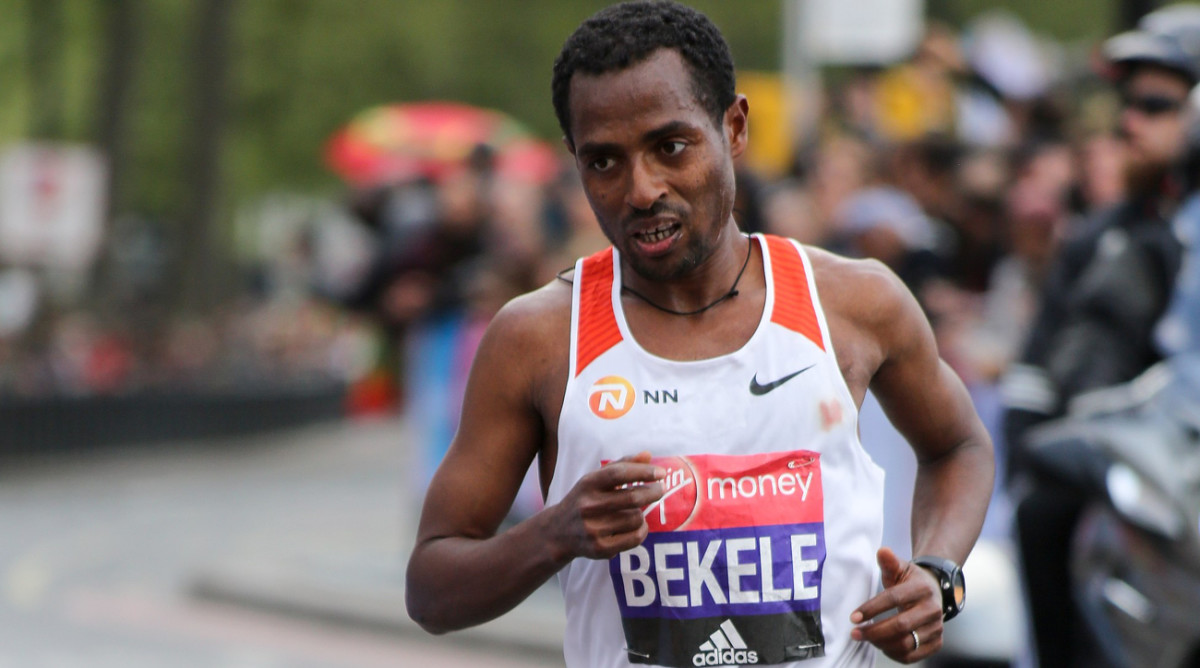A Running Great Readies For NYC Debut: Kenenisa Bekele Headlines Marathon Elites

When Kenenisa Bekele lines up for the Berlin Marathon on Sept. 26 and New York City Marathon on Nov. 7, it will be the first time since 2004 that he will not be introduced as the world record holder in the 5,000 meters or 10,000 meters. However, the three-time Olympic champion and five-time world outdoor champion still firmly believes he can make a case for being the greatest distance runner in history.
“I still feel that I am the best and better than anyone,” Bekele said in a telephone interview from his home in Addis Ababa on Tuesday morning. “I think every athlete and others should think like that.”
Even before Kenya’s Eliud Kipchoge crossed the finish line in two hours, eight minutes and 38 seconds to win the men’s marathon at the Olympics for his second gold medal, the debate among running fans has leaned toward awarding Kipchoge the GOAT title. Like the tireless MJ vs. LeBron conversation, the debate can go on and on - except instead of shouting in a bar, this typically happens during group long runs.
Bekele advocates point toward the Ethiopian’s 16-5 all-time head-to-head record against Kipchoge from 2003 to 2012 in cross country and track before they both transitioned to the roads. When the debate is mentioned to Bekele, he is not shy about citing his 11 world cross country championship titles, compared to Kipchoge’s one.
“Those who follow the sport for 20 years, it’s easy for them to evaluate and judge because of how many races I’ve done, what races to categorize from indoor championships to world cross country championships,” Bekele says. “What I’ve done in world cross country, no one has done before. Apart from that, on the track, I’ve done some of the best things even with many strong competitors in that time.”
Since 2014, Kipchoge has beaten Bekele in all four of their marathon duels including their most recent marathon in London in 2018, where Kipchoge ran 2:04:17 for the win and Bekele faded back to 2:08:53 for sixth place.

In 2014, world-renowned coach Renato Canova (who worked with Bekele for a few years) told Runner’s World that Bekele would someday contend for the world record and was the model for the ideal marathoner. Injuries and inconsistent training have prevented Bekele’s physical tools from producing a record as perfect as Kipchoge’s over the past decade, however, as he’s been forced to withdraw from or drop out of multiple major races.
In September 2018, Kipchoge set the marathon world record running 2:01:39 in Berlin. A year later, Bekele gave it a scare but ended up two seconds shy with a 2:01:41 win on the same course, a brief vindication for Canova’s prediction. Kipchoge opted to bypass that fall major marathon season to become the first man to break the two-hour barrier in an optimized exhibition race that was ineligible for world records for a number of reasons, including a rotating cast of pacers.
“Even if my time is the second-best, it’s only two seconds behind Eliud Kipchoge,” Bekele says. “This time can tell you if I am healthy, prepared and planned well, I will do better than anyone. I believe in this.”
The closest shot at a true clash of titans in their prime came last October when London Marathon organizers dished out enough appearance fee money for Kipchoge and Bekele to headline the men’s race, an elite-only affair in a race heavily modified due to COVID-19 precautions. Bekele made it to London but withdrew two days before the race due to a calf injury sustained in the final workout of his training block in Ethiopia. In cold and rainy conditions, Kipchoge ended up finishing eighth, snapping a 10-marathon win streak that spanned over seven years.
Kipchoge’s loss proved to be just a blip in his historic resume as he rebounded with a 2:04:30 tune-up win in April at the Rotterdam Marathon before reasserting his dominance with a masterclass performance in brutally hot and humid weather in Sapporo, becoming only the third man in history to defend his Olympic gold in the marathon. All the while, Bekele has kept training and watching.
“Right now, I’m 100% injury-free and preparing well,” Bekele says. “I’m happy at this time.”
With Berlin and New York, Bekele is looking to reach two finish lines in a span of 42 days. Due to pandemic-related postponements, all six world marathon majors are stacked upon each other this fall (although Berlin and New York are traditionally both held in the fall). The New York City Marathon will be celebrating its 50th anniversary and the organizers at New York Road Runners convinced Bekele to double back for his first race in America since 2013 and his first in New York since 2006. Even in a normal year, the proximity of Berlin and New York makes any attempt to pull off wins in both a Herculean task. No man or woman has ever done it.
“For a whole year, I couldn’t race and it’s been really difficult for athletes,” Bekele says. “I want to take this chance and see what is possible.”
Similarly, Bekele is of the belief that a year without long racing seasons was partly the reason why athletes have been breaking world records on the track in both the men’s and women’s distance events all throughout the past 12 months. At the Tokyo Olympics, three world records and more than 150 national records were shattered.
Last August, 23-year-old Ugandan Joshua Cheptegei took down Bekele’s 12:37.35 world record for 5,000 meters, which had stood for 16 years, when he ran 12:35.36 to win the Monaco Diamond League. In October, Bekele lost his 10,000 meter world record of 26:17.53 when Cheptegei ran 26:11.00 in a time trial organized in Valencia, Spain.
Another point that often gets brought up in the GOAT debate is the fact that track and field record books are facing a technological boom. Advances in footwear technology, better track surfaces, and (as was the case in both of Cheptegei’s track records) wavelight pacing technology signaling desired paces to athletes have all contributed to an overall jump in performances. The Bekele faithful will argue he did it all the old-school way and his times should be worth more.
“Of course, technology helps a lot but apart from that athletes got time to try for these records and try maximum efforts,” Bekele says. “If there was no COVID and it was normal like before, maybe they don’t get chances to try these records...They can plan, recover well and try records. Altogether, it’s helped a lot.”
“Many people still appreciate my records and encourage me saying, ‘You are our original world record,’” Bekele says with a laugh. “They give me advice and appreciation. On the other hand, in sport of course there are no two records in one race. There is only one record. If [World Athletics] or any sport organization recognizes the records as official then you can’t do nothing. You have to agree with them.”
Berlin and New York will also get the chance for Bekele to showcase his fitness after not being named to the Ethiopian Olympic team for Tokyo. If the Olympics had been held in 2020, he believes the selection committee would have chosen the team based on personal bests and recent performances at the world marathon majors. His 2:01 clocking from 2018 would’ve made him a shoo-in. This year, however, with little notice to most elites, the Ethiopian Athletics Federation decided to stage a 35-kilometer race in May that would serve as the country’s trials for selection. Bekele opted not to race it due to the race’s proximity to the Olympics in August and was not considered.
Ask Bekele about it and he does not hold back when expressing his disappointment. He called the federation’s decision “stupid” and dove into the politics between agents, coaches and federation members. In the end, all three of the men selected by the Ethiopian Athletics Federation ended up dropping out during the marathon in Sapporo.
It has been nearly a decade since Bekele has donned the red, yellow and green Ethiopian kit on the global stage for a world championship or Olympics. At 39 years old, he has voiced no plans of retiring, so the conversation naturally leads to the possibility of Paris 2024
“Of course!” he says without hesitation. “Why not? I know some athletes who have done it at 42 or 43. You can do it if you are prepared well and go into it healthy. It’s possible of course.”
To do so, Bekele had better hope his federation doesn’t mind his public criticism. But whether it’s during Olympic selection or a GOAT debate, as always, he lets his performances speak for themselves.
